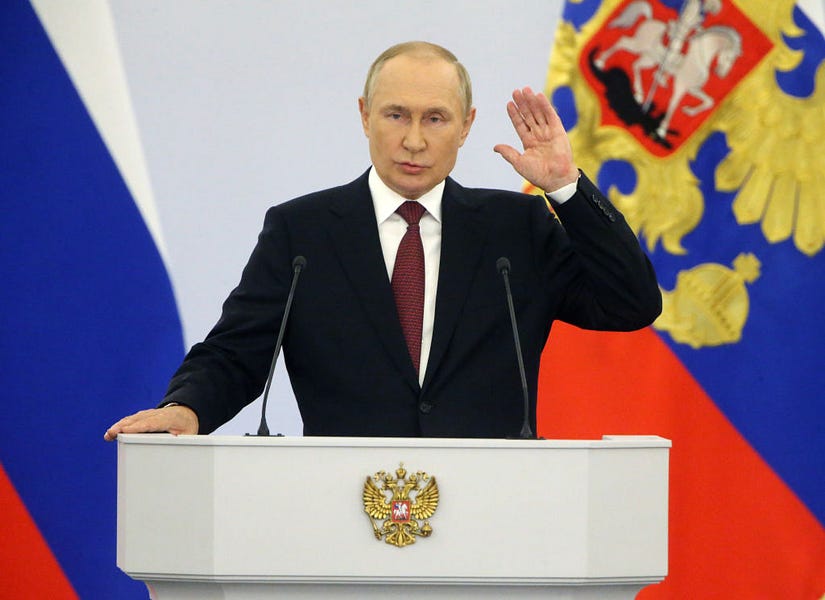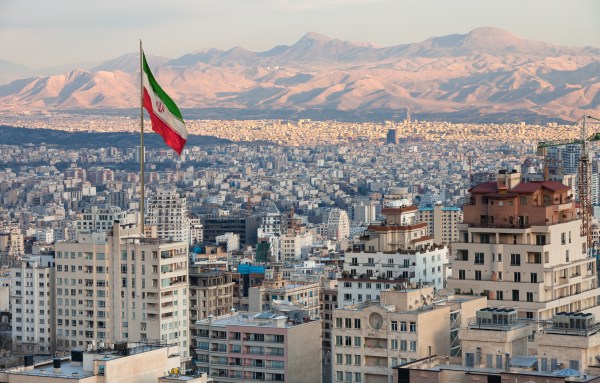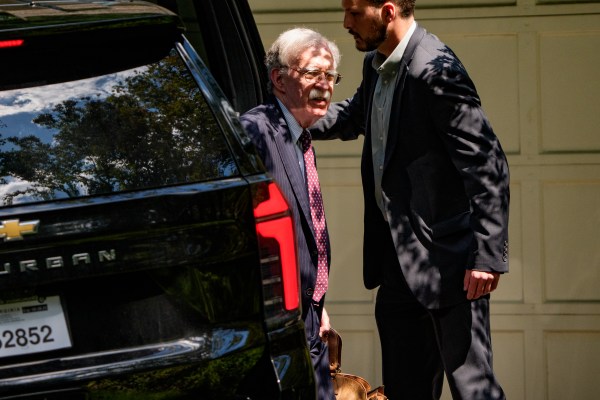If I had told you two years ago that in 2022 the president of the United States would be heard babbling inanely about the risk of “Armageddon” during an international crisis, you would have said, “So Trump won the election, huh?”
He didn’t. It was the other non compos mentis septuagenarian on the ballot who won. You know, the old pro who’s been in Washington since the Nixon era and who would, we were assured, be too savvy to blather his way into needless provocations toward belligerents.
The advisability of Joe Biden’s chitchat with Democratic donors aside, he’s not crazy to believe that a single small “tactical” nuclear detonation by Russia in Ukraine might lead the war to spiral quickly under the logic of deterrence. If Russia went nuclear, Ukraine’s allies would need to respond lest other rogue powers conclude there’s no price to pay for using weapons of mass destruction. Once those allies responded, the Kremlin might feel obliged to escalate further to prove to its own allies and to Putin’s domestic subjects that Russia won’t be cowed by Western military might. That escalation might mean further nuclear use, which would then require an expanded Western response. The only limit on where the cycle of retaliation goes from there is the darkness of one’s own imagination.
A strange game. The only winning move is not to play. But what if Putin insists on playing?
Think it through and you’ll see that there’s no sound strategic argument for him to go nuclear. However you foresee it playing out, Russia loses more than it gains by doing so. It makes no sense.
What we should consider is the possibility that Putin has stopped making sense. His reputation in the West as a master strategist, the closest thing reality has to a “Bond villain,” is as dead as the tens of thousands of Russian soldiers that have been scraped off the fields of Ukraine since February.
Americans worry about North Korea and Iran having nukes because we fear that the leadership in those countries has propagandized themselves into a degree of fanaticism that makes mass death a “rational” response in certain circumstances. The Russians aren’t that way, it’s said. They may be crooks and sociopaths but they’re cool customers, coldly rational about the consequences of escalation. The Russian government is a mafia and the mafia keeps its eye on the bottom line.
Are we sure that’s still true?
Last week Klon Kitchen analyzed the strategic considerations of Russia using a low-yield nuclear weapon in Ukraine, but you don’t need his degree of expertise to grasp why it would be idiotic.
Ask yourself: If you had one tactical nuke to use against the Ukrainians, where would you fire it to ensure that the benefits of doing so exceed the costs? Those benefits would need to be enormous because the potential costs are steep. In all probability they include the sinking of your fleet and airstrikes on your infantry by your Western enemies and a rupture in relations with your Eastern allies, China and India. More and harsher sanctions would also be imposed, to the extent there’s anyone or anything left in Russia that hasn’t been sanctioned yet.
Would you fire it over the Black Sea, safely away from the population, just to show that you mean business? It seems to me that a “demonstration” blast would show that you don’t mean business, that you’re desperate enough on the battlefield to fire a nuke but sufficiently afraid of the consequences that you won’t actually murder people by doing so. NATO might respond by bombing your troops anyway. Or Biden and Zelensky might just laugh at you while Ukrainian troops press ahead in the Donbas and Kherson.
Would you fire it at the Ukrainian army? That might be worth doing if the bulk of their forces were massed somewhere in a small area such that a single detonation would cripple the resistance. Pack 500,000 Ukrainian troops into a stadium somewhere and, with one bomb, you could change the entire complexion of the war. But Ukrainian forces aren’t massed in a single small area. They’re spread out across two fronts that span hundreds of miles. You won’t break their army by nuking a small fraction of it. If anything, you’ll just make them madder.
If you want to meaningfully deplete Ukraine’s forces by using nukes you’ll have to fire many more than one, which means not just breaking the nuclear taboo but shattering it. And that means the consequences to your country will be that much more dire.
Would you fire it at critical Ukrainian infrastructure, like a dam or power plant? You might kill a bunch of Ukrainian civilians that way, directly or indirectly, but you can damage infrastructure and murder civilians as easily with conventional weapons. It’d be foolish to bring down the world’s wrath on your head over an attack that might have been accomplished through less provocative means to muted international objections.
Would you fire it at Zelensky’s residence in Kyiv, assuming you could get close enough? The spectacle of Ukraine’s national hero perishing in a nuclear inferno would gratify Russians, but there’s no reason at this point to think his death would destroy Ukrainian morale or derail the military’s offensive. His great contribution to the war came early when he rallied his people to resist and the West to arm them. He’s done his part; U.S. weapons shipments won’t stop if he dies tomorrow. Killing him now would make him a martyr to no good end.
The strongest argument to go nuclear in Ukraine is the notion of “escalate to de-escalate,” a military doctrine that calls for using weapons of mass destruction to halt an enemy advance. If your troops are being routed, the theory goes, firing off a nuke will terrify your opponent into pulling back and suing for peace for fear that the war will spiral into nuclear conflict if they don’t.
No one believes the Ukrainians would behave that way following a nuclear detonation, though. They have momentum, perhaps unstoppable momentum, on the battlefield. They’ve learned through grim experience that submitting to occupation by Russia means kidnapping, torture, and murder in perpetuity. Better to go out in a flash than to live life being ground down every day under Putin’s boot. And although the jittery West would doubtless prefer to see Ukraine de-escalate after a Russian nuclear strike, the need to deter other rogue states from using WMD in battle will compel them to stand firm and retaliate.
There’s no scenario in which going nuclear is to Russia’s net benefit — if Putin is still a rational actor and if his goal remains winning the war and absorbing Ukraine into Russia.
How lucky do you feel?
Months ago, after the Russians had been pushed out of the suburbs around Kyiv, I remember watching a clip from Russian state media in which a dejected nationalist on the panel mused about nuclear war. What’s the point of having a world if Russia isn’t in it, he wondered?
His question brought me up short because at the time I didn’t understand what he meant. How would we end up with a world without Russia in it? No matter how bad things get for Putin’s army, the Ukrainians won’t be marching on Moscow. Nor will anyone else, a fact Russia acknowledged recently when it began deploying troops stationed on its western border to Ukraine. After decades of Kremlin propaganda about the military threat from NATO, they’ve now conceded that it’s safe to leave their border with NATO basically undefended.
Russia isn’t going anywhere.
But the Russian empire? That’s going bye-bye. To the extent it hasn’t already.
That’s what the dejected nationalist meant, of course. What’s the point of living if Russia can’t menace its near-abroad with impunity? Of what value is civilization if Russia can no longer lead the unfree world against the United States? What kind of posterity are we bequeathing to our children where the Russian army can’t steamroll some Ukrainian hicks in a week as a first step to restoring Soviet imperium?
It’s an urgent question because that’s the world we suddenly, shockingly, find ourselves living in. None of us knows precisely how the Ukraine war will end but it’s already plain as day that “Russia,” by which I mean the dream of a Russian empire, will no longer exist when it’s over.
It’s becoming plain to the Russians too. If you followed news of the war last week, you found yourself immersed in tales of what the kids today call “cope.” Russian state media has reluctantly begun to face the magnitude of the military’s predicament in Ukraine, typically with a stiff upper lip. But not always.
The clearer it becomes to them that their imperial fantasies won’t survive the war, the clearer it becomes that certain prominent people might not survive either. The quest to find a scapegoat who lost the empire appears to be settling on Russian Defense Minister Sergei Shoigu, who landed his job 10 years ago the old-fashioned way—through cronyism, despite having no military experience. Chechen leader Ramzan Kadyrov and Wagner Group founder Yevgeny Prigozhin, both infamously ruthless operators, have blamed Shoigu for the flailing war effort in Ukraine. So have lesser Russian officials. Putin himself pointed to the defense ministry recently when asked why some Russian men well above the age limit were being swept up in the new mobilization.
Shoigu, clearly, is being set up as the fall guy for the war. He’s a “safe” target for public discontent inasmuch as blaming him means exculpating Putin, a man who might have you killed if you dare to lay Russia’s incompetence at his feet. But even Putin has reportedly begun to hear complaints behind closed doors: On Friday the Washington Post claimed he was “confronted” recently by an unnamed Kremlin insider about the state of the war. Sources told the paper that there’s “growing alarm” within his inner circle and that criticism of the czar is getting louder inside the Kremlin. “There is scapegoating. Finger-pointing. All of this is happening,” said one intelligence official. So it is.
Not all of it is happening sotto voce either. Here’s the most interesting video to circulate last week, and not for the obvious reason.
Yes, it’s interesting that Russian troops are complaining publicly about being grossly underequipped. But more interesting is the fact that some of the men in the clip are wearing the insignia of the Wagner Group, the elite Russian paramilitary force (that’s turning less elite by the day) commanded by Prigozhin. Kremlinologists are wondering whether Prigozhin might have staged the clip to embarrass Shoigu—and Putin—in hopes of eventually replacing one or both.
The jockeying to fill a potential power vacuum may have begun.
One Russian journalist who works in state media told the Guardian that “intense dread” now haunts the country’s elite. “The higher you go, the more desperation you feel. There is general understanding now that the war can’t be won.” Each day seems to bring a searing new humiliation. On Wednesday of last week alone, Western media reported that the Ukrainians were advancing in all four provinces that Russia had just purported to annex and that Russia itself had inadvertently become the biggest supplier of heavy weapons to Ukraine’s military thanks to fleeing Russian troops abandoning their armaments in the field en masse.
There’s no near-term prospect, and probably no long-term prospect, that this will turn around either.
It’s against this backdrop, amid perceptions that the war has turned shambolic and speculation that his own grip on power is slipping, that Putin is weighing whether to inflict the ultimate weapon on the Ukrainians.
One wonders if he might come to the conclusion that he has nothing left to lose.
As we’ve seen, it would be irrational for him to use nukes if his goal is to conquer Ukraine, as it was in February. Apart from the military consequences, to do so would be to irradiate land he hopes to incorporate into his own country. The fallout from a detonation might even be carried into Russia by the winds and end up sickening thousands in border cities like Belgorod.
But if “there is general understanding now that the war can’t be won” among Russia’s elite, that understanding may also have finally penetrated the thick bubble of imperial fantasy that surrounds Putin. If it has, he must have quietly abandoned the goal of conquering Ukraine at some point. Yet the fight goes on.
Which raises the question of what his new goal might be. A strategy that’s irrational with respect to achieving one goal might be a perfectly rational means to achieve another, after all.
If Putin now fears that his authority within Russia is at risk, he might rationally calculate that a show of nuclear ruthlessness across the border will frighten his domestic enemies into relenting—an “escalate to de-escalate” strategy with respect to the likes of Prigozhin. NATO could respond by liquidating his navy, sure, but so what? The war is already lost. Better to lose quickly, with pride, to the mighty West than to die by inches over the course of another bloody year to the puny Ukrainians.
Another “rational” benefit of using a nuke would be inflicting massive damage on the global economy by instigating panicked sell-offs around the world in the aftermath. Russia has suffered under Western sanctions and will continue to suffer. If it’s now destined to lose in Ukraine, it might as well have its revenge by sending America’s and Europe’s economies into a tailspin. Think of a tactical nuclear weapon as a sort of economic sanction that takes a microsecond to impose. Spite is “rational.” Sort of.
One suspects, though, that Putin hasn’t quite accepted yet that the war is unwinnable. If he had, calling up a million troops via an unpopular ham-fisted national mobilization would be a curious move.
Which means, if a nuke goes off in Ukraine tomorrow, it will necessarily have been triggered by a spasm of humiliation. It must humiliate him to watch troops from a Russian “colony,” not even a proper country in his mind, breaking through his army’s lines. It must humiliate him to know how ludicrous his belief that Russia is a “peer” of the United States has turned out to be. It must humiliate him to know that his great project, becoming a modern Peter the Great, will end with him having left Russia badly diminished, a soon-to-be vassal of China. He’s less a Peter than a Nicholas II and there’s nothing he can do to change that now. I imagine he marinates in his anxiety over it every day.
What if this is the voice he’s begun hearing in his head?
If Putin can’t menace his near-abroad with economic power and he can no longer menace them with conventional military power, there’s one way left he can still menace them. I wouldn’t call it “rational,” exactly, but if all he has left is a strongman’s resentment at having been exposed as a weakling, there’s a certain selfish logic to wanting to undo that impression by the most vivid available means.
Hopefully he won’t be given the chance. Hopefully.







Please note that we at The Dispatch hold ourselves, our work, and our commenters to a higher standard than other places on the internet. We welcome comments that foster genuine debate or discussion—including comments critical of us or our work—but responses that include ad hominem attacks on fellow Dispatch members or are intended to stoke fear and anger may be moderated.
With your membership, you only have the ability to comment on The Morning Dispatch articles. Consider upgrading to join the conversation everywhere.